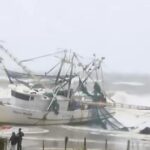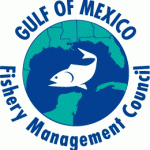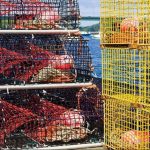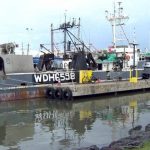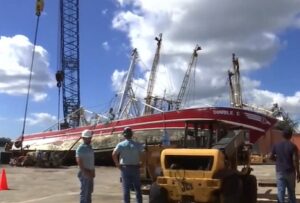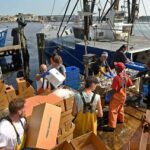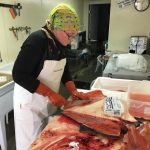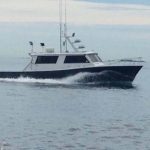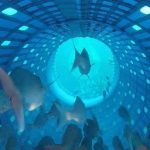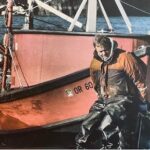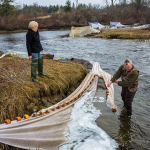Tag Archives: Canadian government
Why Canada’s decision to lift a ban on cod fishing in Newfoundland after 32 years is so controversial – Podcast
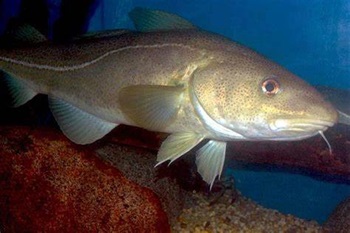 For generations, cod fishing was a way of life in Newfoundland and Labrador, the easternmost province in Canada. But in 1992, after cod stocks in the north Atlantic plummeted, the federal government imposed a moratorium on cod fishing. It was to last for 32 years until it was lifted in June 2024. Fishing has been the backbone of the economy for centuries, and so when the Canadian government imposed a cod moratorium in 1992 it had a huge impact, with an estimated 30,000 people in Newfoundland and Labrador out of work overnight. Some cod fishing was permitted in inshore waters from the late 1990s in boats less than 20 metres long, but all commercial offshore trawler fishing was prohibited. Links, more, >>CLICK TO READ<< 11:48
For generations, cod fishing was a way of life in Newfoundland and Labrador, the easternmost province in Canada. But in 1992, after cod stocks in the north Atlantic plummeted, the federal government imposed a moratorium on cod fishing. It was to last for 32 years until it was lifted in June 2024. Fishing has been the backbone of the economy for centuries, and so when the Canadian government imposed a cod moratorium in 1992 it had a huge impact, with an estimated 30,000 people in Newfoundland and Labrador out of work overnight. Some cod fishing was permitted in inshore waters from the late 1990s in boats less than 20 metres long, but all commercial offshore trawler fishing was prohibited. Links, more, >>CLICK TO READ<< 11:48
Canadian government to build conservation hatchery in Prince George to boost Chinook and sockeye salmon recovery
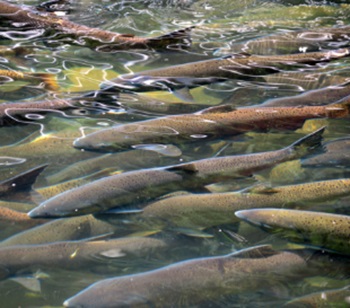 The Canadian federal government has announced plans to build a new Pacific salmon hatchery in Prince George, British Columbia (B.C.). This initiative, supported by the Pacific Salmon Strategy Initiative (PSSI), aims to bolster the conservation and recovery of wild Chinook and sockeye salmon populations. Operated by Fisheries and Oceans Canada (DFO) in partnership with the Lheidli T’enneh First Nation and Canfor Pulp Ltd., the hatchery will be constructed this fall on federal land along the Nechako River, near its junction with the Fraser River. “As a Nation, fisheries are central to the work we do,” said Chief Dolleen Logan, on behalf of Lheidli T’enneh First Nation. “We remain committed to maintaining biodiversity in our traditional territory while enhancing salmon populations throughout the region.” more, >>CLICK TO READ<< 13:02
The Canadian federal government has announced plans to build a new Pacific salmon hatchery in Prince George, British Columbia (B.C.). This initiative, supported by the Pacific Salmon Strategy Initiative (PSSI), aims to bolster the conservation and recovery of wild Chinook and sockeye salmon populations. Operated by Fisheries and Oceans Canada (DFO) in partnership with the Lheidli T’enneh First Nation and Canfor Pulp Ltd., the hatchery will be constructed this fall on federal land along the Nechako River, near its junction with the Fraser River. “As a Nation, fisheries are central to the work we do,” said Chief Dolleen Logan, on behalf of Lheidli T’enneh First Nation. “We remain committed to maintaining biodiversity in our traditional territory while enhancing salmon populations throughout the region.” more, >>CLICK TO READ<< 13:02
As Europe reviews its rules on seal products, Canada calls for easing of restrictions
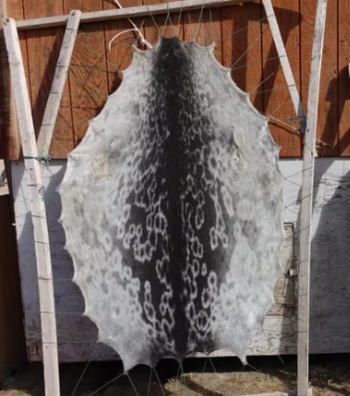 The Canadian government is calling on the European Union to ease restrictions on seal products as member states review trade regulations. Ottawa said in a letter dated Tuesday to the European Commission’s vice-president that Canada has been given the opportunity to “provide input” on the seal trade while the union fine tunes its rules. The outcome is scheduled to be published on the site in eight weeks. In 2009, the European Union limited imports for Canadian seal products, citing the “pain, distress, fear and other forms of suffering” of seals because of the way in which they are killed and skinned. Canada has many species of seals including bearded, grey, harbour, harp, hooded and ringed. Three of these — grey, harp, and hooded — are killed for commercial uses. more, >>CLICK TO READ<< 10:44
The Canadian government is calling on the European Union to ease restrictions on seal products as member states review trade regulations. Ottawa said in a letter dated Tuesday to the European Commission’s vice-president that Canada has been given the opportunity to “provide input” on the seal trade while the union fine tunes its rules. The outcome is scheduled to be published on the site in eight weeks. In 2009, the European Union limited imports for Canadian seal products, citing the “pain, distress, fear and other forms of suffering” of seals because of the way in which they are killed and skinned. Canada has many species of seals including bearded, grey, harbour, harp, hooded and ringed. Three of these — grey, harp, and hooded — are killed for commercial uses. more, >>CLICK TO READ<< 10:44

Fisheries report brings hope to Indigenous communities, sparks anger in industry
“I was pleasantly surprised, to be honest,” said Rosalie Francis, a member of the Sipekne’katik First Nation in Nova Scotia. But elsewhere in the province, the surprise has been significantly less pleasant. There are concerns the report titled “Peace on the Water” is instead stoking anger in communities where lobster is a livelihood. Representatives of the commercial fishing industry say they’re frustrated they weren’t invited to speak to the Senate as it drafted the report on Indigenous rights. It’s “throwing fuel on a fire” in an area where tensions have remained high since 2020, said Colin Sproul, president of the Unified Fisheries Conservation Alliance, which has about 1,900 members. >click to read< 12:09
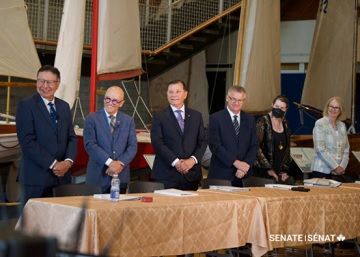
New Report Shows Canadian Government Has Failed Indigenous Fishers
The Standing Senate Committee on Fisheries and Oceans had harsh words for the Canadian federal government. At a meeting this week in Halifax, Nova Scotia, the committee presented its new report, which looked at the implementation of Indigenous rights-based fisheries. Its findings suggest that, despite more than two decades since key precedents were set, the fisheries have not been fully implemented. This has led, the committee stated, to confusion, tension and violence. In Canada’s Atlantic provinces (Nova Scotia, New Brunswick, Prince Edward Island and Newfoundland and Labrador), as well as parts of Quebec, 35 First Nations have a treaty right to fish for a moderate livelihood. >click to read< 14:50
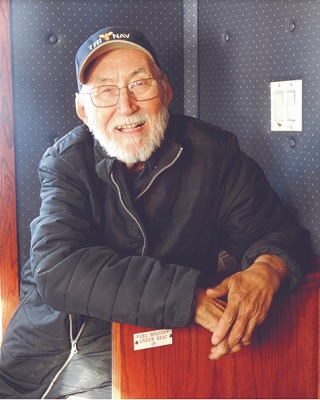
The cod delusion – A moratorium on cod fishing that was supposed to last two years has now lasted 30.
Three decades on, the latest DFO science still puts Atlantic cod in the critical zone. “I hope politicians and bureaucrats in Ottawa have learned something, because I’ve learned something: the moratorium was the biggest catastrophe ever heaped on the people in this province, ever. Nothing has been as bad as this,” says Captain Saunders, an 80-year-old Inuk. Seated in the wheelhouse of his longliner, docked in Pinsent’s Arm in late September 2021, Saunders speaks with the authority of someone with six decades of fishing experience, backed by centuries of hindsight. “Newfoundland and Labrador people fished for 500 years and didn’t damage the stocks. What Canada done was an atrocity in my opinion. It ruined a way of life. It ruined culture. All the stages, stage heads, they’re all falling apart, they’re all deteriorated — that’s the government did that.” >click to read< 17:40
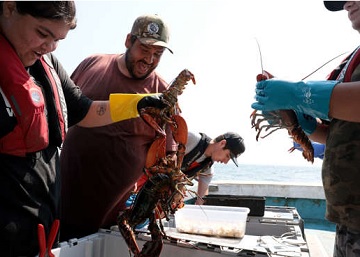
As lobster population booms off Canada, tensions rise between Indigenous and commercial fishermen
Under the close watch of federal officers on surrounding patrol vessels, Robert Sack navigated his old boat toward his clandestine traps in the cold waters that his people have fished for centuries, expecting to be arrested at any moment.,, Each trap had a special tag belonging to their band of the Indigenous Mi’kmaw people, who insist that a 269-year-old treaty grants them the right to fish when and how they want. But the government has rejected their assertion, and officers have seized their traps, confiscated their boats, and even arrested some of their fishermen. >click to read< 07>14
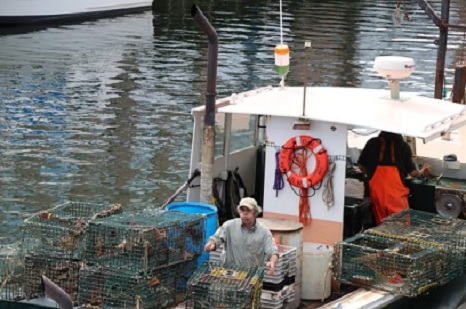
DMR briefs legislature on impact of NOAA’s new lobstering rules, options for appeal
On September 14, the Maine Legislature’s Committee on Marine Resources met and discussed the impact new rules recently released by the NOAA will have on Maine’s lobster industry, as well as the state’s legal options for appealing the rules.,, The new rules not only close nearly 1,000 square miles to lobstering between October and January, a time of year when lobster prices are at their highest, but changes the kind of gear lobstermen can use. Also discussed were threats to the right whale posed by Canada. As Keliher pointed out, the NMFS’ biological opinion noted that even if Maine is  100% successful in taking steps to protect right whales, whales will continue to go extinct if they continue to be hurt in Canada. Keliher also stated that he has had conversations with the head of> NOAA, Richard W. Spinrad, Ph.D < who hasn’t yet had a meeting with the Canadian government, but has agreed to raise the issue of including state representatives in Canadian affairs. Keliher also said NOAA’s head considers these conversations to be a government-to-government issue. He stated he disagrees and continues to press the issue. >click to read< 15:51
100% successful in taking steps to protect right whales, whales will continue to go extinct if they continue to be hurt in Canada. Keliher also stated that he has had conversations with the head of> NOAA, Richard W. Spinrad, Ph.D < who hasn’t yet had a meeting with the Canadian government, but has agreed to raise the issue of including state representatives in Canadian affairs. Keliher also said NOAA’s head considers these conversations to be a government-to-government issue. He stated he disagrees and continues to press the issue. >click to read< 15:51
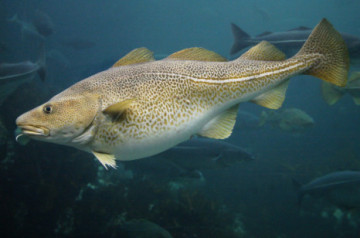
Fishing Industry reps withdraw from Canada-France meetings after DFO recommends 3Ps cod moratorium
Canada and France began negotiations today, March 23, to decide who can fish for what on the south coast of Newfoundland but representatives from the fishing industry won’t be there. Atlantic Groundfish Council, Fish Food and Allied Workers, and Association of Seafood Producers have all announced they will withdraw from the bilateral meetings to determine quotas in protest over Canada’s intent to place a moratorium on cod in the 3Ps zone. The decision to withdraw comes after the industry learned late Friday,,, >click to read< 17:56
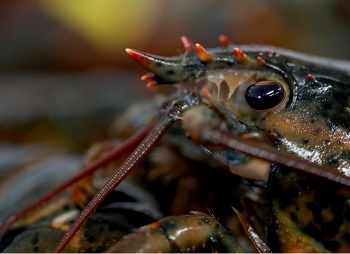
Canadian government likely has not met constitutional obligations to First Nations
The precedent set by the Supreme Court of Canada in the Marshall cases recognizes the First Nations’ right to fish under the Peace and Friendship Treaties but also allows for limitations by the government for the purpose of conservation. The Badger decision set out the parameters for applying those limitations and puts the onus on the federal government to show that the infringement of treaty rights is justified, and to consult with First Nations to find a solution that puts the minimum restrictions on Indigenous rights. The 13 Nova Scotia First Nations chiefs have unanimously rejected Jordan’s plan for a number of reasons, a major one being a lack of consultation. >click to read< 11:45
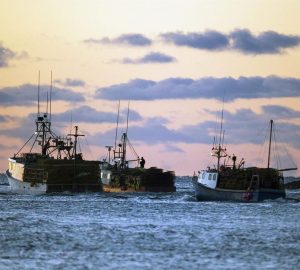
Feds announces $4.85M to buoy Nova Scotia’s struggling fish and seafood sector
The federal government has announced funding for a dozen projects in western Nova Scotia to buoy the province’s struggling fish and seafood processing sector. Fisheries Minister Bernadette Jordan says the $4.85 million for 12 projects at 11 companies will help the sector retool and find new markets, positioning the industry for a strong post-pandemic recovery. She says the funding, part of the $62.5 million Canadian Seafood Stabilization Fund announced by Ottawa last spring, is expected to create 60 jobs in rural communities across western Nova Scotia. >click to read< 13:36

Lobster fishing must remain in season – ‘The federal government has allowed a regulatory system with unconstitutional provisions’
Wayne Easter, the P.E.I. MP who chaired the federal fisheries committee looking at moderate livelihood fisheries 21 years ago, says there are still questions to be resolved, but fishing out of season shouldn’t be one of them. In two decisions in 1999, known as Marshall I and Marshall II, the Supreme Court of Canada affirmed that Indigenous people have historic treaty rights to moderate livelihood fisheries. Easter’s committee was asked to examine the implications and made 28 recommendations. The current federal fisheries committee has begun another review. >click to read< 10:42
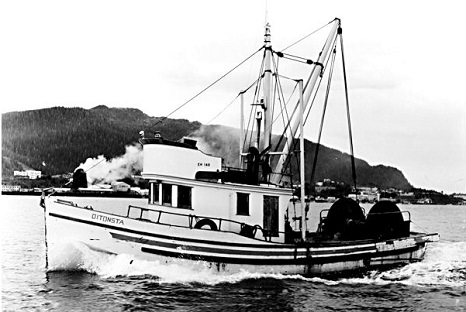
Before Fiberglas – British Columbia & Wahl Boatyard
In the early 1900’s with the pushing through of the Grand Trunk Pacific Railway from Edmonton to Prince Rupert, the Canadian government promoted land grants and settlements up the coast of British Columbia. Many Scandinavians took advantage of the opportunity and moved their families to Canada’s west coast. Fishing and logging were the staples of the economic engine at the time, and boats were needed for both as well as for transportation between coastal communities. Many of these settlers chose to build their own boats. In the early 1920’s, Ed Wahl moved his family from Norway and settled in Port Essington, a small community on the west coast situated due west of Edmonton and south of Prince Rupert, near the mouth of the Skeena River. photos, links, >click to read< 10:38

‘Find some good solutions’: governments, experts, fishermen prepare for 2020 right whale regulations
An annual roundtable meeting held by officials with the Department of Fisheries and Oceans has wrapped up after discussing how to deal with the declining North Atlantic right whale population. The subject has become controversial after at least nine confirmed deaths in 2019, with several preliminary findings indicating vessel strikes were the cause. Some of the deaths came despite the Canadian government cracking down tighter on fisheries closures and speed restrictions, but the impact on the fishing industry is part of what makes regulations such a controversial topic. >click to read< 08:43

Low numbers of endangered whales raise question about lobster industry impacts
Woods Hole Oceanographic Institution scientist Mark Baumgartner said that to help the whales survive much longer, the ropes Maine lobstermen use to tend their traps have to be modified or even eliminated. And it’s not just for the whales’ sake. “I feel the industry is in jeopardy,” Baumgartner said.,,, Last month the Conservation Law Foundation’s Portland office filed a federal lawsuit against the National Oceanic and Atmospheric Administration for violating the Endangered Species Act. >click to read< 12:10
Canadian government announces funding to improve commercial fishing safety
 The Canadian government has announced a new Commercial Fishing Safety component of the Government of Canada’s Boating Safety Contribution Program. Under this new component, up to $300,000 per year for the next three years will be available to support education and awareness initiatives that promote safe boating practices onboard small commercial fishing vessels across Canada. Read the rest here 14:58
The Canadian government has announced a new Commercial Fishing Safety component of the Government of Canada’s Boating Safety Contribution Program. Under this new component, up to $300,000 per year for the next three years will be available to support education and awareness initiatives that promote safe boating practices onboard small commercial fishing vessels across Canada. Read the rest here 14:58
The Canadian government recently approved, without fanfare, the world’s first genetically modified fish to be produced in PEI.
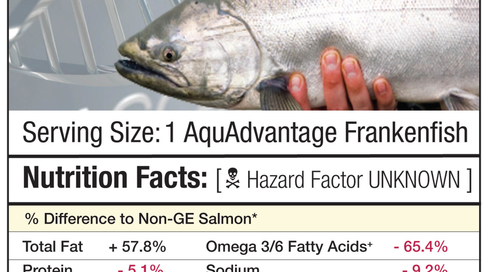 Canada quietly made history last November when officials at Environment Canada gave the go-ahead on production of the world’s first genetically modified food fish: the AquAdvantage® salmon. Read more here 06:56
Canada quietly made history last November when officials at Environment Canada gave the go-ahead on production of the world’s first genetically modified food fish: the AquAdvantage® salmon. Read more here 06:56

































